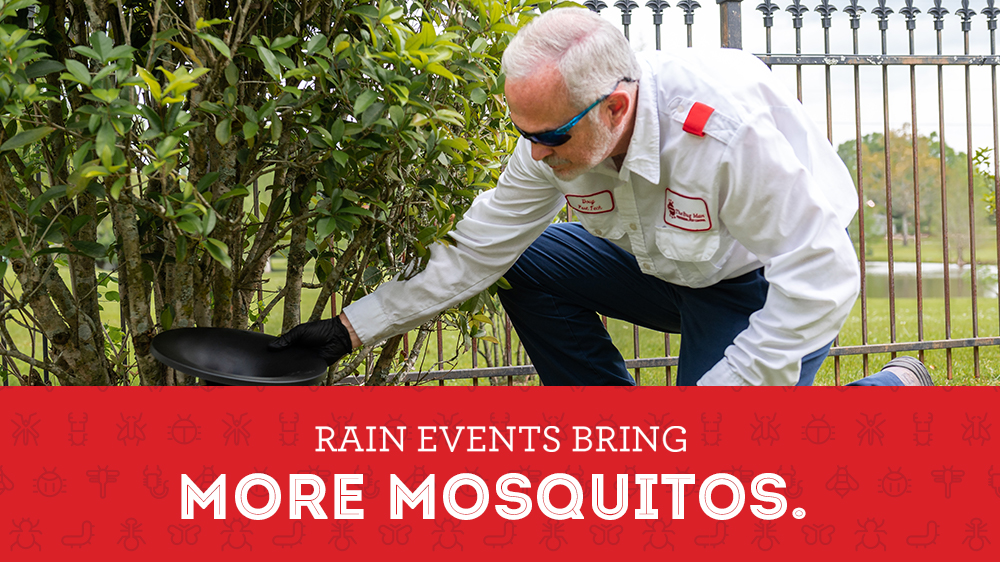Mosquitoes in Louisiana can be particularly nasty and aggressive, especially with the warm weather rains we get that provide plenty of opportunities for standing water where mosquitoes breed and flourish. We’re here to share a few tips on treating these pesky pests, particularly how to limit their numbers and keep them from biting you. But first, a few sobering facts of why mosquitoes can be more than just a nuisance.
- According to the World Health Organization, mosquitoes infect between 330-600 million people a year with Malaria and Dengue, just two of the life-threatening diseases that mosquitoes can carry.
- Mosquitoes kill more people (over 700,000 per year) than any other animal on the planet by far. The closest in fact would be snakes, they kill around 50,000 people per year.
- Over 1 million pets in the U.S. alone are estimated to be infected with heartworms, which are passed along through mosquito bites. The infection rate for dogs over 2 years old is thought to be over 80% in South Louisiana.
Make Your Yard and Land Less Hospitable to Mosquitoes
One way to lessen the amount of mosquitoes on your property is to eliminate areas for them to breed. Female mosquitoes prefer to lay their eggs near stagnant water and can lay anywhere from 100 to 300 eggs at a time. These larvae can hatch within 48 hours. That’s a lot of mosquitoes! Here’s what you can do.
- Eliminate sources of standing water and dispose of water-holding containers, such as tin cans, plastic containers, ceramic pots, used tires, and tire swings.
- Pay special attention to discarded tires that may have collected on your property. Stagnant water in tires is a common place for mosquitoes to breed.
- Drill holes in the bottom of containers such as those used for recycling.
- Clean clogged roof gutters.
- Turn over objects that may trap water when not in use, such as buckets, wading pools and wheelbarrows.
- Change water in bird baths on a weekly basis. Do not allow water to stagnate in birdbaths; aerate ornamental ponds or stock them with fish.
- Clean and chlorinate swimming pools. When pools are not in use, use pool covers and drain when necessary. Be aware that mosquitoes may even breed in the water that collects on swimming pool covers.
- Use landscaping to eliminate standing water that collects on your property. Mosquitoes will develop in any puddle that lasts for more than four days.
Fight the Bite!
Mosquitoes feed on blood from humans and other animals, which is why they bite. Use the following measures to help reduce bites from these pests.
- Be particularly careful at dusk and dawn, when mosquitoes are most active.
- Wear shoes, socks, long pants and long-sleeved shirts. Clothing material should be tightly woven.
- Use mosquito netting when sleeping outdoors or for baby strollers.
- Use mosquito repellent when you are outdoors. Always use according to label instructions. The most effective repellents contain DEET, Picaridin, oil of lemon eucalyptus or IR3535.
- Always wash treated skin when returning indoors. Do not apply repellent under clothing, to wounds or irritated skin, the hands of children, or to infants younger than two months old.
- Be sure your home’s door and window screens are tight fitting and in good repair to avoid mosquitoes entering indoors.
If you are still experiencing mosquitoes on your property, it’s a safe bet you should call a pest control professional. The mosquito treatment plan usually begins with a thorough property inspection and identifying the kind of mosquitoes that are causing problems. Once the inspection and identification are complete, your pest management professional will prepare a mosquito treatment plan best suited for your property, such as mosquito pots, misting systems, or yard fogging.
If you are concerned about a mosquito breeding site in or around your home, consider calling a pest management professional. The Bug Man provides three revolutionary mosquito treatments that don’t just repel mosquitoes, the unit kills them for good! Our newest mosquito program is a great, inexpensive alternative to yard fogging. We place mosquito pots around your yard that sterilize a female mosquito from laying eggs. For an effective mosquito solution, contact The Bug Man and ask about their mosquito services or give us a call at (225) 923-2847.




